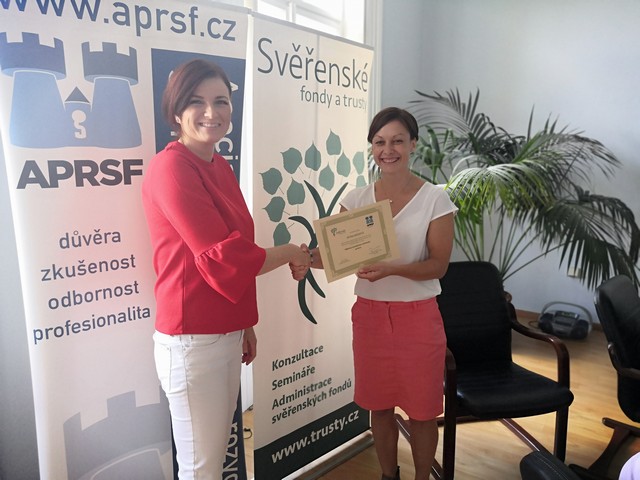Here are a few of the photos from the latest APRSF Trustee and Trust Adviser Seminar. Thanks to everyone who participated. It was a great course.
Month: June 2020
Seminar: Using Czech Trusts with Real Estate
Since they were introduced in the Czech Republic in 2014, interest in and the use of Czech Trusts has increased strongly. One of their main uses is to own real estate. This is done for a variety of reasons including asset protection, inheritance, and confidentiality.
There have been other presentations on Trusts in the past, but this one is focused specifically on the area of real estate. It is designed for real estate professionals including agents, developers, and property managers, and also for the owners of real estate who might be considering using a Trust. It will present the topic from all angles, explaining both the positives and negatives of using Trusts in this way.
The seminar will cover:
- The basics of a Czech Trust. What is it and how does it work?
- Practical uses of Trusts including examples
- Uses of Trusts in the area of Real Estate
- Taxation
- Practical considerations
There will also be time available for questions and answers
Both presenters are experts in this field and this seminar provides a unique chance to benefit from their experience and knowledge.
Date: 8 September 2020
Time: 09.00 – 12.30
Venue: Praha, bude upřesněno
Seminar Language: Czech
Presenters:
Mgr. Eva Hrušková,
Partner, Svěřenské fondy a trusty s.r.o.
Matěj Nešleha
Jednatel, Tax Adviser, KODAP Jihlava, s.r.o.
Registration: by email to: info@trusty.cz
Seminar fee: 2.900,- Kč
The seminar will be held in the centre of Prague. The exact location will be advised to participants in August.
Update on Current Situation with the Evidence skutečných majitelů
As a number of people have asked us for an update on this topic, we have prepared one.
Note that the situation in this area is constantly changing. It is a complicated issue which has the potential to affect all trusts in the Czech Republic. However as things currently stand, none of those effects are negative.
We are constantly monitoring the situation and we will be advising our clients once it becomes clear what action, if any it is necessary to take.
There are two aspects to this issue:
1. Current Law
 The current law on this area is set out in zákona č. 304/2013 Sb., o veřejných rejstřících právnických a fyzických osob a o evidenci svěřenských fondů.
The current law on this area is set out in zákona č. 304/2013 Sb., o veřejných rejstřících právnických a fyzických osob a o evidenci svěřenských fondů.
This existing law requires the trustees of trusts to register their trust on the Evidence skutečných majitelů before 1 January 2021. As a result, we had been encouraging clients to file their registration and offering to assist with this process, and many, but not all our clients have already registered.
However a new draft law has been introduced. This draft law, if it is passed in its current form, will remove the obligation for most clients to do anything. This is because the register of skutečný majitel will automatically use the data already held by the state on the Evidence svěřenských fondů. Under the draft law, it would only be necessary to file something in very rare cases when the data transferred by this process would lead to an incorrect result.
We applaud this step as it removes unnecessary duplication of paperwork for most clients.
Since we became aware of the draft law, we have been advising clients to take no action. That is because the new law is scheduled to take effect in December 2020, meaning that the January 2021 deadline contained in the existing law would cease to be relevant.
There are a few exceptions to this. Some banks etc still require registrations under the current law, and in such cases, we are able to assist you with this.
Both the current register and the register proposed by the draft law are non-public in the case of trusts, so in essence, for most clients this is a welcome change, with no negative effect.
BUT
As you will see from the points below, it is now uncertain if the new law will take effect in time (e.g. before the January deadline). If it does not, or if it looks likely that it will not, from our next quarterly review in September we will be recommending to existing clients that they file on the register before the deadline. We have also asked the Ministry of Justice to provide some clarity on this point.
2. Agrofert
The second issue is more complicated and applies specifically to clients whose trusts own shares in their family companies. It is not relevant to other clients.
Under the draft law, the evidence skutečných majitelů will be publicly accessible for companies, but not for trusts. We agree with this approach and especially the continued confidentiality for trusts.
That is because unlike companies, almost all trusts are private/family structures, and there is no public interest in making the details public. In addition, the protection of the right to family privacy associated with most trust is enshrined in both Czech and EU law.
In our opinion, this protection of family trust data should also apply where the trust is the owner of a company. As we mentioned above, under the draft law, the skutečný majitel of the company will be publicly visible. If the owner of the shares is another legal entity, then the skutečný majitel of that legal entity will also be visible. However in the case where a trust is the owner of the shares, the current draft of the new law says that the protected people on the register of trusts (e.g. the Founder and Supervisor if any) should not appear as the skutečný majitel of the company.
This makes sense to us as anything else would indirectly expose the trust to public scrutiny and defeat the privacy protections mentioned above .
The problem that arises in the case of Agrofert is that the shareholders of Agrofert are probably trusts established by Mr Babis. As Mr Babis is (again we are guessing) probably the founder of the trusts, then the Trusts will appear as the skutečný majitel of the company but Mr Babis will not appear (or at least will not appear publicly) as the skutečný majitel of the trusts, and therefore also not of the company.
Various people, rightly or wrongly, disagree with this. It is not for us to express an opinion on this, mainly political, argument.
However what concerns us would be any ‘blanket’ solution which would affect not just Agrofert and other large companies of national significance, but would also affect many smaller family companies.
Remember that the organs of the state will have full access to the data, so this is not a question of what is the true situation, but only a question of what the general public can see.
In the case of trusts It will still be possible for trustees to voluntarily provide this information to banks etc, but it is not appropriate for nosy neighbours etc to have free access to this information which is in any case protected by both Czech law and the EU Convention on Human Rights.
Our hope is that the draft law will go through in its current form, or, if it is changed to accommodate these concerns, the changes should apply only to large companies, not to family businesses.
Again, we are monitoring this situation and will report on developments in our quarterly reviews (or sooner if necessary).










